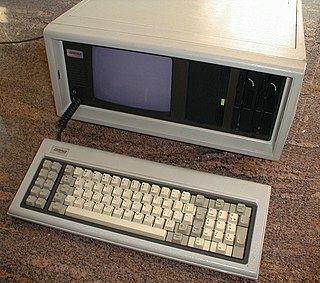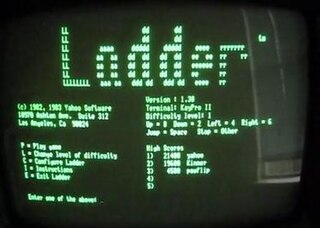
CP/M, originally standing for Control Program/Monitor and later Control Program for Microcomputers, is a mass-market operating system created in 1974 for Intel 8080/85-based microcomputers by Gary Kildall of Digital Research, Inc. Initially confined to single-tasking on 8-bit processors and no more than 64 kilobytes of memory, later versions of CP/M added multi-user variations and were migrated to 16-bit processors.
Kaypro Corporation was an American home and personal computer manufacturer based out of San Diego in the 1980s. The company was founded by Non-Linear Systems (NLS) to compete with the popular Osborne 1 portable microcomputer. Kaypro produced a line of rugged, "luggable" CP/M-based computers sold with an extensive software bundle which supplanted its competitors and quickly became one of the top-selling personal computer lines of the early 1980s.

The Osborne Computer Corporation (OCC) was a pioneering maker of portable computers. It was located in the Silicon Valley of the southern San Francisco Bay Area in California. Adam Osborne, the founder of the company, developed, with design work from Lee Felsenstein, the world's first mass-produced portable computer in 1981.

The Osborne 1 is the first commercially successful portable computer, released on April 3, 1981 by Osborne Computer Corporation. It weighs 24.5 lb (11.1 kg), cost US$1,795, and runs the CP/M 2.2 operating system. It is powered from a wall socket, as it has no on-board battery, but it is still classed as a portable device since it can be hand-carried when the keyboard is closed.
In marketing, product bundling is offering several products or services for sale as one combined product or service package. It is a common feature in many imperfectly competitive product and service markets. Industries engaged in the practice include telecommunications services, financial services, health care, information, and consumer electronics. A software bundle might include a word processor, spreadsheet, and presentation program into a single office suite. The cable television industry often bundles many TV and movie channels into a single tier or package. The fast food industry combines separate food items into a "meal deal" or "value meal".

A portable computer is a computer designed to be easily moved from one place to another and included a display and keyboard together, with a single plug, much like later desktop computers called all-in-ones (AIO), that integrate the system's internal components into the same case as the display. The first commercially sold portable was the 50-pound (23 kg) IBM 5100, introduced 1975. The next major portables were Osborne's 24-pound (11 kg) CP/M-based Osborne 1 (1981) and Compaq's 28-pound (13 kg), advertised as 100% IBM PC compatible Compaq Portable (1983). These "luggable" computers still required a continuous connection to an external power source; this limitation was later overcome by the laptop. Laptops were followed by lighter models, so that in the 2000s mobile devices and by 2007 smartphones made the term almost meaningless. The 2010s introduced wearable computers such as smartwatches.
The Osborne effect is a social phenomenon of customers canceling or deferring orders for the current, soon-to-be-obsolete product as an unexpected drawback of a company's announcing a future product prematurely. It is an example of cannibalization.

Ladder is a barrel-jumping game like Donkey Kong written for the CP/M operating system and made to be operated on the early Kaypro line of luggable computers. Ladder was written by Yahoo Software of Los Angeles, California.
A Christian video game, or Bible game, is a video game based on teachings of Christianity; it is a part of the larger Christian media genre and media format.

Following the introduction of the IBM Personal Computer, or IBM PC, many other personal computer architectures became extinct within just a few years. It led to a wave of IBM PC compatible systems being released.

A personal computer (PC) is a multi-purpose microcomputer whose size, capabilities, and price make it feasible for individual use. Personal computers are intended to be operated directly by an end user, rather than by a computer expert or technician. Unlike large, costly minicomputers and mainframes, time-sharing by many people at the same time is not used with personal computers. Primarily in the late 1970s and 1980s, the term home computer was also used.

MicroPro International Corporation was an American software company founded in 1978 in San Rafael, California. They are best known as the publisher of WordStar, a popular early word processor for personal computers.
S-BASIC was a "structured" BASIC variant, distributed with Kaypro CP/M systems. It was made by Topaz Programming is distributed by Micro-Ap.

CatChum is a text-only clone of Pac-Man written for the CP/M operating system and made to be operated on the early Kaypro line of luggable computers.
Aliens is a text-only clone of Space Invaders written for the CP/M operating system and made to be operated on the early Kaypro line of luggable computers. It was written by Yahoo Software of Los Angeles, California. Along with Star Trek, CatChum, and Ladder, Aliens was one of the games that came with the early Kaypro computers.
Richard Dalton was a former editor of the Whole Earth Software Review. He was president of Keep/Track Corporation when he died of prostate cancer on Oct. 24 2016, age 76. For nine years he was a research affiliate of the Institute for the Future in Menlo Park, California specializing in emerging technologies and their business and social implications. He was a featured columnist for InformationWeek and Windows Magazine, and also wrote a column for Byte.com. He has recently spoken at Comdex, the Groupware Users Exchange, the InterClass European Conference and the Federal Government Group Decision Technology Conference.
Perfect Writer is a word processor computer program published by Perfect Software for CP/M, subsequently rewritten and released as Perfect II by Thorn EMI Computer Software for IBM PC compatible computers. It was written in C and famous for its stability. It was an enhanced version of MINCE, which itself was a version of Emacs for microcomputer platforms. Emacs itself was too heavyweight to fit within the 64kb RAM limit of most microcomputers. Like MINCE, it included a floppy disk based virtual memory system.

The Zorba was a portable computer running the CP/M operating system manufactured in 1983 and 1984. It was originally manufactured by Telcon Industries of Fort Lauderdale, Florida, a company specialized in telecommunication equipment manufacturing.









